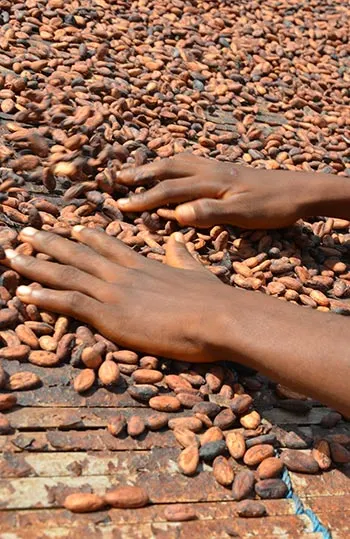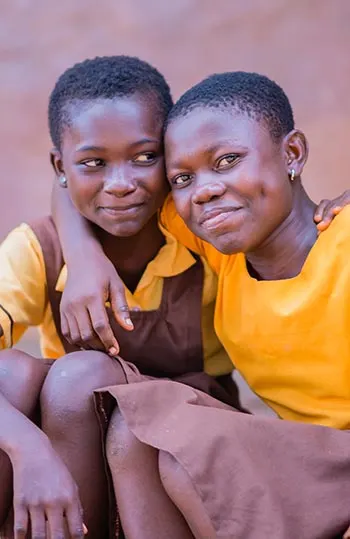- /
Social Sustainability & Human Rights
We're committed to making our snacks the right way and to respect the human rights of people in our value chain. We care about the lives we touch and are committed to treat everyone fairly, from workers in our plants to smallholder farmers and their communities in our agricultural supply chains.
OUR AIM* | 2023 PERFORMANCE |
|---|---|
100% manufacturing sites completed SMETA audit within the past 3 years | 91% |
100% prioritized supplier sites completed SMETA audit in past 3 years | 90% |
Child Labor Monitoring & Remediation Systems (CLMRS) cover 100% Cocoa Life communities in West Africa by 2025 | 75% |
At Mondelēz International our Human Rights Policy applies to all employees worldwide, aligned with our Code of Conduct, and our Supplier Code of Conduct. We undertake practical, proactive, and ongoing human rights due diligence to identify, mitigate and reduce the likelihood of potential and actual human rights impacts within our own operations, and work with our business partners in our supply chain to achieve the same.

We undertake practical, ongoing human rights due diligence to identify, mitigate and reduce the likelihood of potential and actual human rights impacts within our own operations, and work with our business partners through our supply chain to achieve the same.
In our own operations and with our tier 1 suppliers, we use Sedex Member Ethical Trade Audits (SMETA) to identify potential human rights issues and monitor compliance with our policies. In addition, before engaging in new business relationships and during the course of business, we conduct appropriate and risk-based due diligence to inform our procurement practices.
In our raw materials supply chain, our efforts have primarily focused on cocoa and palm oil because this is where we know that we can make the biggest difference from an environmental and social perspective. In the cocoa and palm supply chains, we have developed comprehensive approaches to identify potential human rights impacts through our signature Cocoa Life program and our Palm Oil Action Plan.
Beyond our signature programs, we're embedding sustainability into our sourcing practices for other raw materials. We're seeking more transparency, raising expectations of our suppliers and seeking to catalyze sector-wide change. Through this work we are addressing cross-cutting themes such as good agricultural practices, deforestation, human rights (including labor rights such as forced and child labor), land rights, gender and environmental footprint.
Through human rights assessments of our own operations and supply chain, we have identified the following salient human rights risks:
- Child labor
- Forced labor
- Health and safety
- Freedom of association and collective bargaining
- Land rights
- Water and sanitation
- Women’s rights

Child labor is a symptom of underlying systemic issues in the cocoa supply chain such as poverty and slow rural development. Our Cocoa Life program’s holistic approach addresses these root causes through interventions to increase income, empower communities to advocate for their development, and the empowerment of women at household and community level.
In addition, in Côte d’Ivoire and Ghana, where third-party studies including independent assessments commissioned by Mondelēz International confirmed a significant risk of child labor, we are setting up a Child Labor Monitoring and Remediation System (CLMRS) in all Cocoa Life communities. Under CLMRS, people have been sensitized to the dangers of child labor, remediation is under way for identified vulnerable children, the local school is involved, children are learning about their rights, and a committee of community volunteers is in place to be the focal point on child protection issues and to take action when a child is found to be in child labor.
Ending child labor across the West African cocoa sector is more than we can do alone and we believe that a sector-wide, long-term strategy that requires coordinated action by all players in the value chain is critical. That is why we collaborate with all actors of the cocoa supply chain and through our involvement with the World Cocoa Foundation (WCF) and the International Cocoa Initiative (ICI), we support a systemic approach to address the root causes of child labor and call for strong public-private partnerships with governments, development partners and civil society organizations.

Forced labor is estimated to affect 16 million people globally in the private sector. Recognizing its systemic nature, we have joined forces with manufacturers and retailers through the Consumer Goods Forum to contribute to the eradication of forced labor. The CGF has identified three of the most problematic, yet often common, employment practices across the world that can lead to instances of forced labor. We support these Priority Industry Principles on Forced Labor that should be upheld by as many actors as possible:
- Every worker should have freedom of movement
- No worker should pay for a job
- No worker should be indebted or coerced to work
These principles guide our ongoing due diligence, as well as our efforts to continuously improve our recruitment and procurement practices and to build the capacity of our teams to better recognize and address forced labor risk.
*We aim to regularly and transparently report our progress. You can find additional details on Mondelēz International's ESG goals and reported information within the About This Report section of our 2023 Snacking Made Right ESG Report.